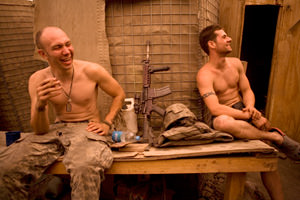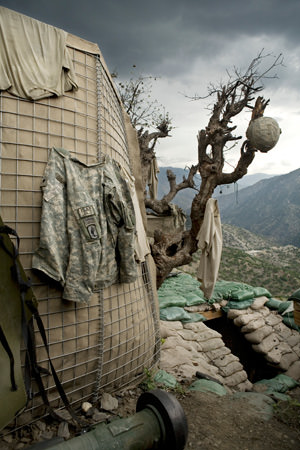Into the Valley of Death Rode the … 15?
The documentary "Restrepo" paints an empathetic portrait of U.S. soldiers at an Afghanistan outpost, but it keeps its audience at a distance.
Restrepo was the name of an American Army outpost in Afghanistan’s beautiful, dangerous Korengal Valley. It was built and maintained, from May 2007 until July 2008, by 15 members of the 173rd Airborne Brigade with the goal of interdicting Taliban troops as they moved freely through the valley, aided occasionally by the local inhabitants, who also at times at least pretended to be allied with the Americans. The outpost was named for an American soldier, a medic, who was killed early in the fighting, and “Restrepo” is, as well, the title of a documentary film by Sebastian Junger — he of “A Perfect Storm” and currently the author of the best-selling “War,” which draws on the same material as the film — and the well-known combat photographer Tim Hetherington. Together and separately they visited the outpost 10 times, for stays of up to a month in duration.
I think you can quite easily imagine the tenor of their film. The small-unit-under-pressure is a subject that has attracted both documentary and fictional filmmakers for decades. This is, at least, a subgenre and, as such, it operates within the confines of certain fairly rigid conventions. The fictional variety often offers a psycho commanding officer or a grunt who has doubts about the value of the unit’s mission and has to be brought around to its value by the good nature (and the sacrifices) of his fellows. The documentaries, not requiring much in the way of melodramatic pressure, dispense with such figures. They are, in a sense, much more existentially oriented. They present their characters as dutiful, trusting and without any particular questions to ask or ideological axes to grind.
So it is with “Restrepo.” The luck of the military draw has brought this disparate group together in a dangerous and uncomfortable place. Their task is simply to soldier on until their tour of duty ends. The filmmakers wisely do not interview their top commanders about the larger meaning of their assignment, and the men simply accept, as a given, that what they’re doing must have some larger strategic value. The implication is that despite their hardships, despite the fact that they are regularly engaged in firefights (and take casualties), what they’re doing may be more interesting than the alternatives available to them in civilian life. This unworthy thought sometimes occurs to the viewer: Their stay at Restrepo is something like a camping trip in rough, remote country, but with real bullets flying around, and with the possibility that at its end they may become better men as a result of their experience.
They grouse, they laugh, they listen politely to their captain’s attempts to explain their mission, but mainly they watch one another’s backs and bond quite easily as a result of their shared adventure. The filmmakers justifiably like them and, as a result, we do, too.
But this brings us the crux of films like “Restrepo” and its ilk. One day the soldiers’ tour of duty is over. We see them happily climbing onto helicopters and flying out of the Korengal Valley, bound for a peaceful base in Italy and, I guess, eventual deployment back home. A title card then informs us that the high command has decided to suspend operations in the area. Which means that their 14 months of blood, sweat and (perhaps) manly tears have been meaningless. No ground has been taken, the Taliban is still moving through the valley at will and a mission once thought to be vital turns out to have had no lasting value whatsoever. None of the men whose company we have come to like is heard to comment on that point. They are just happy to have come through in one piece, with war stories, as one or two of them observe, to tell their children or grandchildren.
|
Photo by Tim Hetherington courtesy National Geographic Films |
To them it is just another of those snafus that are so much a part of military life. I like it that Junger and Hetherington make this point without direct, moralizing comment. The notion, so frequently played out in World War II combat movies, that each small unit’s triumphs or martyrdoms inevitably contributed to a much greater common triumph — booming voice-over narration, inspiring music (sometimes played against shots of the United Nations’ massed flags moving toward a dawning sun) — is long (and gratefully) gone. I think we now fully understand that soldiers in the field fight only for their buddies, for their unit’s survival. Geopolitics is somebody else’s business.
There is, however, a cost to this taciturnity. Limiting our emotional response to the travails fighting men endure is a little bit like limiting war aims; it distances us from the conflict, prevents us from engaging fully, dramatically, suspensefully, in it. Certainly in this instance no one in this beleaguered group becomes fully particularized as a human being.
This standoffishness became a ruling convention in films about the Vietnam War. Putting it mildly, our moral qualms about that war prevented everyone this side of John Wayne from unambiguously identifying with our troops. Which left us with a rather squishy humanism — “Oh, the poor guys, it’s not their fault; let’s go levitate the Pentagon, instead” — to tide us along. Because the aims of our wars since have not particularly advanced, that’s pretty much where we remain. And that’s pretty much where “Restrepo” is entrapped. We eventually take our leave of these soldiers with sympathetic feelings intact, but also with the sense that we have been here before, that the filmmakers have not narrowed the distance between us and their subjects, not given us a film that leaps the gap between us and them. Or, for that matter, diminished the distance between the high command and the lowly dogface, each lost in contradictory — though possibly equally absurd — military obsessions.
Richard Schickel, whose celebrated and prolific career spans 50 years, has been the film critic for Time and Life magazines, has written more than 20 books and has produced, written and directed numerous documentaries.
Your support matters…Independent journalism is under threat and overshadowed by heavily funded mainstream media.
You can help level the playing field. Become a member.
Your tax-deductible contribution keeps us digging beneath the headlines to give you thought-provoking, investigative reporting and analysis that unearths what's really happening- without compromise.
Give today to support our courageous, independent journalists.







You need to be a supporter to comment.
There are currently no responses to this article.
Be the first to respond.